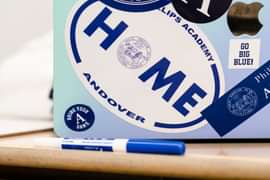December 15, 2016
Dan Schwerin ’00 wrote his way through historic campaign
Needs Summaryby Phillips Academy
Seeking unity after a presidential election that upended polls and media predictions, dozens of students gathered in CAMD to watch Hillary Clinton’s November 9th concession speech live. Just hours earlier, students of all political stripes had gathered at the library to watch the election returns and blog, tweet and opine about one of the most contentious political races in modern American history.
Whether their preferred candidate won or lost, emotions ran high on both sides of the aisle. Many students were lifted by Clinton’s words, particularly her call for inclusivity:
“We spent a year and a half bringing together millions of people from every corner of our country to say with one voice that we believe that the American dream is big enough for everyone. For people of all races, and religions, for men and women, for immigrants, for LGBT people, and people with disabilities. For everyone.”
The chief writer behind the speech—and all of the major addresses by Clinton in recent years—was alumnus Dan Schwerin ’00. The former Phillipian editor-in-chief continues to follow campus headlines and support students, most recently helping to establish an endowment for the Phillipian’s digital platform.
While his connection to Andover on November 9 was fortuitous, the fact that young voters were on his mind—and Clinton’s—was purposeful. In a conversation that took place just days after the election, Schwerin described Clinton’s efforts to reach millennial voters. “She was very thoughtful about what the country, and especially the millions of young people who had supported her, needed to hear in that moment,” said Schwerin, who started as a Senate intern to Clinton in 2004.
Despite the stinging election loss, Schwerin remains inspired by the craft that builds on his journalistic foundation. He describes speechwriting as a process that takes a lot of research and collaboration, but still comes down to facing a blank page. “In terms of storytelling or argument, speechwriting sits at the intersection of policy and communication. It’s a tool to help overcome political challenges,” he said.
After a decade with Clinton, he’s seen a number of high stakes challenges emerge, especially on the international front, where language can pose a barrier and words must be carefully parsed, accounting for cultural norms and possible misinterpretation. China quickly came to mind.
“A blind human rights dissident had taken refuge in our embassy in Beijing, and we were in town for a big diplomatic conference,” he said. “The Chinese were often very literal with us, and sometimes quoted back previous speeches that made an impression on them. On more than one occasion, I consulted with experts to find a Chinese proverb that would convey our message in a way that resonated more than anything we could write in English.”
Reflecting on domestic issues, he said some of their most important campaign messages—speeches on racial justice, for example—emerged after Clinton spent time with parents who had lost children to gun violence or following tragedies like the Charleston, S.C., church shooting.
Whatever the topic—Wall Street reform, affordable college, international trade—he often leans on subject experts and fundamental skills learned at Andover to distill complex ideas and produce compelling prose. Faculty emeritus Meredith Price and the late Robin Crawford were instrumental in his development as a writer. His Phillipian advisors, Nathaniel Smith and the late Tom Lyons, instilled in all students respect for the freedom—and responsibility—of the press. “More than once, I’ve wished I had them taking a red pen to my latest effort,” said Schwerin.
At The Phillipian Schwerin spent many late nights “on deadline” in the basement of Evans Hall, the former newsroom. “Those experiences were really important to me,” he said, “and they put me on a professional path, ultimately.”
His Bishop Hall mate, Nick Johnson ’99, was a source of friendship and fuel when he needed it most. “Nick had a French press in his room and used to make coffee for everyone brewed specifically for how late you needed to stay up,” recalled Schwerin.
He’s since switched to tea with less caffeine, but his work on the presidential campaign trail required no less stamina. Preparing a major address was a 24-7 enterprise, meaning he could expect a 4 a.m. call from either Hillary or former president Bill Clinton. Lots of texts back and forth, wordsmithing and dozens of drafts. “That’s ok; it’s something I learned at Andover,” he said. And pre-dawn editing? “That’s something I learned at The Phillipian.”
Categories: Alumni
Other Stories

Five Things is an Andover magazine series highlighting fun and interesting facts about the Academy's people and places.




